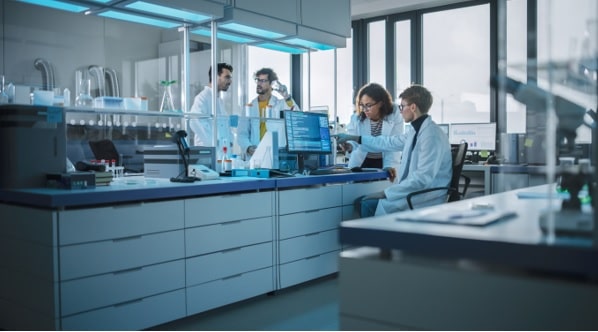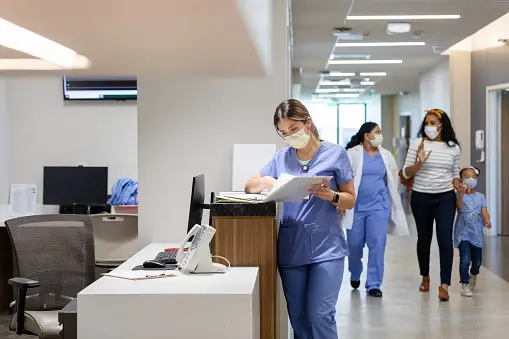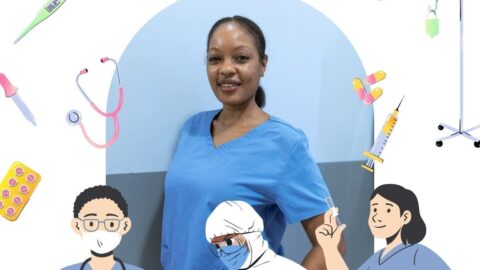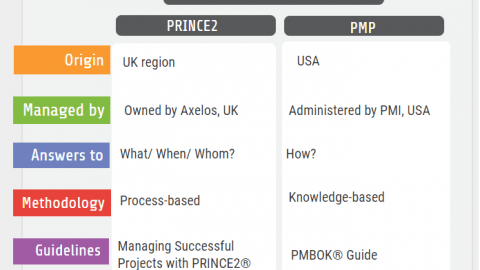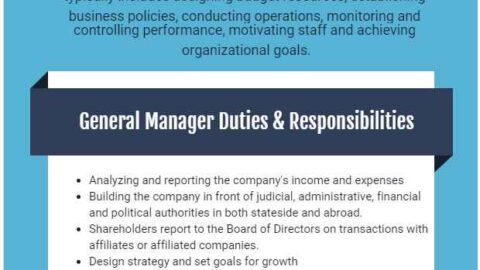Laboratory Experience for Family Nurse Practitioners
Family nurse practitioners (FNPs) have advanced skills and competencies, and when studying for a master’s degree, they need to be fully prepared to fulfil this professional role. The laboratories provide students with the opportunity to apply theory to practice. They can use patient simulators to practice advanced procedures and learn in a safe environment. The clinical skills laboratory allows students to improve their psychomotor skills and competency in different scenarios. Laboratory experience helps Nurse Practitioner students to improve their skills and prepare for their first FNP position.
Table of Contents
The Bureau of Labor Statistics predicts that demand for nurse practitioners will increase by 38% by 2032. It is estimated that nurse practitioners (NPs) will see more rapid growth than any other occupation in America. There are many reasons for this growth, including the growing number of older people and the greater need for healthcare among underserved populations. The demand for NPs is also due to how they improve health outcomes and their reputation within healthcare.
Nurses who wish to advance their careers can become FNPs by studying the online FNP program at the American International College. Graduates provide family healthcare to patients of all ages and have the expertise to provide direct patient care and improve health outcomes. FNPs are in demand by healthcare organizations that need them for their nursing expertise and to make healthcare more accessible to the communities they serve. This profession is growing to meet different populations’ needs and has many employment opportunities.

What is the meaning of nurse practitioner?
A Nurse Practitioner (NP) is a highly trained and specialized advanced practice nurse who provides healthcare services similar to those of a physician. Nurse practitioners have advanced education, clinical training, and certification that allow them to take on a broader scope of practice than registered nurses (RNs).
What is the role of a nurse practitioner?
A Nurse Practitioner (NP) is an advanced practice nurse with specialized education and training who plays a crucial role in providing comprehensive healthcare services. NPs assess and diagnose medical conditions, develop and implement treatment plans, and focus on health promotion and disease prevention. They educate patients, collaborate with healthcare teams, and often have prescriptive authority.
Clinical Skills Laboratories: What are they and how do they help?
Synthesis and reasoning
Clinical skills laboratories are a traditional learning environment used by all levels of Family Nurse Practitioners students.
Technological advances have positively impacted training nurses using the clinical skills laboratory. Hence, student NPs learn and practice in laboratories to develop the essential skills for advanced practice in nursing. The laboratories are developed from evidence-based methods and principles and provide practical experience in preparation for real-life nursing.
The design of the clinical laboratory closely resembles a hospital ward and has the same equipment to ensure relevancy for clinical learning. However, a simulation laboratory provides the means to learn synthesis, critical reasoning, and analysis of complex care situations.
Simulation of Family Nurse Practitioners
Patient simulators are being used to an increasing extent for nursing training. Modern patient simulators have various medical features and respond to interventions with realism. Mannequins are used to represent patients and are computerized to have physiologically accurate responses. Patient simulators can be used to teach advanced skills, such as shock, tension pneumothorax, pulmonary embolism, and the management of difficult airways.
The simulation laboratory can teach students how to recognize and treat rare clinical problems. The training can be set by the needs of the student, not the patient, and the student can practice numerous times. Simulators can provide evidence of performance, and this can contribute to assessment. So, the simulators can give immediate feedback and the opportunity for team education.
Assessing performance
Laboratories typically have video cameras for recording performance and reviewing afterward. There is hospital equipment, such as respiratory, wound care, and electrocardiogram. And there is audiovisual equipment used for evaluative and formative learning for Family Nurse Practitioners. And there is also a debriefing room used for reflection and video review. The simulated environment is a realistic representation of a hospital where students develop their skills before moving into professional practice.
A clinical skills laboratory is a safe place for nurses to learn and improve psychomotor skills and combine theory with practice in preparation for employment. Advanced practice nursing students gain practical experience performing various procedures, including outpatient dermatology procedures, microscopy, and long-acting reversible contraceptive methods.
Collaboration
Laboratory courses teach the clinical and communication skills required for quality patient care. Skill development is aligned with advanced practice management in inpatient and outpatient settings. Students learn about health assessment concepts and skills and develop physical examination and advanced physical assessment skills. They learn to differentiate between normal and abnormal findings. Students learn about managing different health conditions, such as diabetes, across the lifespan. The laboratory focuses on behavioral and family intervention skill development, including problem-solving interventions, behavioral goal setting, coping skills training, and follow-up.
Psychomotor learning of Family Nurse Practitioners
Skills laboratories typically have a Smartboard that enables psychomotor learning, which are movement tasks that need both motor and cognitive processes. The skills required are gross and fine dexterity, movement, and coordination. The development of psychomotor skills requires repetitive practice with feedback which a simulator can provide.
Students can have practical experience performing common primary care procedures, including microscopy, outpatient dermatology procedures, and long-acting reversible contraceptives. Students learn about risks, benefits, indications, alternatives for different procedures, patient management, and patient follow-up. Nurses can put everything they have learned into practice, deal with any problems or issues, and learn in an environment where mistakes do not harm a patient.
The benefits
Family Nurse Practitioners can use laboratory experience to improve their skills in a controlled environment. This is an opportunity to practice and try new things without compromising the health and safety of patients. It is possible to make mistakes and learn from them. Students can learn to use various equipment and gain confidence in what to do. Using repetition and different scenarios can help students become competent and have belief in their abilities.
Real-life situations can be fast-paced, but there is time to ask questions and consolidate knowledge in the laboratory. Students are encouraged to explore all options and outcomes. Simulations give opportunities to practice team communication between healthcare staff and the patient.
The responsibility of Family Nurse Practitioners
FNPs have responsibility and independence at work, making informed decisions and providing high-quality patient care. It is essential that when studying for a master’s degree, they learn the knowledge and skills required for advanced nursing practice. Laboratory work is one facet of this advanced degree program and contributes to preparing students for their first professional role as an FNP. Practicing skills and procedures within various scenarios can help students expand their skills and be more confident in the world of work. Family Nurse Practitioners become comfortable working in the laboratory, which can lead to being comfortable working with patients.
Moving on: Becoming Family Nurse Practitioners
When studying to become an FNP, students must have the knowledge and skills to perform in this advanced role. The FNP has many responsibilities and delivers wide-ranging care. The laboratory is one facet of their education and provides relevant experience and practice. Students can apply theory to practice and become competent at delivering procedures. FNPs work with patients across the lifespan and provide care for many patient concerns. Laboratory work is one way for aspiring FNPs to prepare for this role and have the confidence and skills to meet the challenge.
Irwin Michael Reston is an expert who has more than 30 years of experience in optimizing businesses, inspiring individuals and improving human resources departments. He established the BlueLight Consulting Limited to provide learning and training service worldwide.

